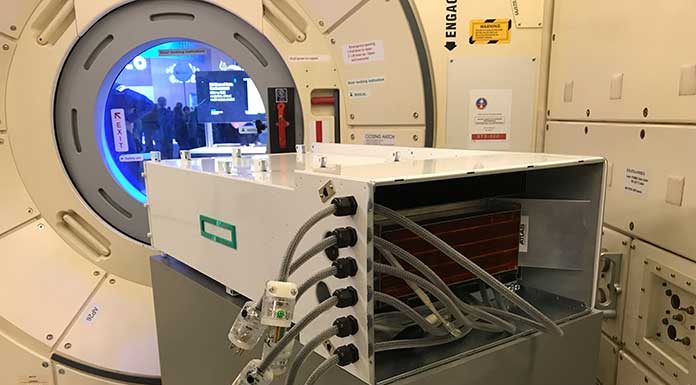Hewlett Packard Enterprise said it is opening high performance computing (HPC) capabilities to astronauts on the International Space Station (ISS) as part of its experiments on the Spaceborne Computer project. Spaceborne Computer is the commercial off-the-shelf (COTS) supercomputer that HPE and NASA launched into space for a one-year experiment to test resiliency and performance, achieving one teraFLOP (a trillion floating point operations per second) and operating on the International Space Station (ISS).
After completing its one-year mission, proving it can withstand harsh conditions of space – such as zero gravity, unscheduled power outages, and unpredictable levels of radiation – Spaceborne Computer will now open its supercomputing capabilities for use aboard the ISS. These “above-the-cloud” services will allow space explorers and experimenters to run analyses directly in space instead of transmitting data to and from Earth for insight.
“After gaining significant learnings from our first successful experiment with Spaceborne Computer, we are continuing to test its potential by opening up above-the-cloud HPC capabilities to ISS researchers, empowering them to take space exploration to a new level,” said Dr. Eng Lim Goh, chief technology officer and vice president, HPC and AI, HPE.
Due to limited computing capabilities in space, many calculations necessary to complete research projects started in space are still processed on Earth. This approach is feasible for running research on the moon or in low earth orbits (LEO) between 400 and 1,000 miles above the Earth's surface, where communication can be in near real-time with Earth.
however, larger communication latencies of up to 20 minutes both to and from Earth can occur when data is captured farther into space and closer to Mars. This reality makes any on-ground space exploration challenging and potentially dangerous if astronauts are faced with mission-critical scenarios that they are unable to solve themselves.
HPE said it is working on these challenges by bringing high performance computing (HPC) capabilities to space explorers with the Spaceborne Computer,
David Hornyak, ISS technology demonstration research portfolio manager, NASA said: “HPE's Spaceborne Computer is a commercial system owned and funded by HPE that is advancing state-of-the-art computing in space and providing supercomputing commercial services on a spacecraft for the first time, all while demonstrating capabilities similar to what NASA may need to pursue for exploration.”
Spaceborne Computer is based on the HPE Apollo 40, a purpose-built high performance computing (HPC) platform. The system stays intact in space without requiring additional hardware. Instead, it uses a software-hardening approach that is integrated with its HPC nodes.







